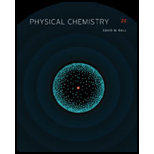
(a)
Interpretation:
The effect of spin-spin coupling on the proton NMR absorptions of butane is to be predicted. The way by which butane can be diffrentiated from cyclobutane and isobutane (
Concept introduction:
Spectroscopy based on the splitting of
(b)
Interpretation:
The effect of spin-spin coupling on the proton NMR absorptions of cyclobutane is to be predicted. The way by which cyclobutane can be diffrentiated from butane and isobutane (
Concept introduction:
Spectroscopy based on the splitting of
(c)
Interpretation:
The effect of spin-spin coupling on the proton NMR absorptions of and isobutane (
Concept introduction:
Spectroscopy based on the splitting of
Want to see the full answer?
Check out a sample textbook solution
Chapter 16 Solutions
Physical Chemistry
- 1. For each of the following, predict the products of the reaction by writing a balance net ionic equation for each. If no reaction is expected, then write NO REACTION. (a) AgNO3 (aq) is mixed with Na2CO3 (aq). (b) An aqueous solution of ammonium sulfate is added to an aqueous solution of calcium chloride. (c) RbI (aq) is added to Pb(NO3)2 (aq). (d) NaCl (s) is added to AgNO3 (aq).arrow_forward4. Determine the amount in grams of AgCl (s) formed when 2.580 g AgNO3(s) is added to 45.00 mL of a 0.1250 M CrCl3 (aq) (The other product is aqueous chromium (III) nitrate) 5. Determine the amount (in grams) of Cobalt (II) phosphate formed when an aqueous solution of 30.0 ml of 0.450 M Sodium Phosphate is mixed with 20.0 mL of 0.500 M aqueous solution of cobalt (II) nitrate. (The other product is aqueous sodium nitrate)arrow_forward7. Consider the following reaction that describes the dissolution of copper metal in nitric acid: Cu (s) + 4 HNO3 (aq) → Cu(NO3)2 (aq) + 2 H₂O (1) + 2 NO2 (g) How many mL of 3.50 M HNO3 (aq) are required to dissolve 20.00 g Cu?arrow_forward
- Please correct answer and don't used hand raitingarrow_forwardDon't used Ai solutionarrow_forward3. An unknown element, X, combines with chlorine to give a substance with the formula XC14. A chlorine analysis of the substance indicates that it contains 83.47% chlorine by mass. What element is X and what is the formula of this compound? (Hint: to identify an element or compound, identify its molar mass. Remember that Molar Mass = (grams A)/(moles A). Solve for each individually and then divide them to find molar mass.)arrow_forward
- 1. When hydrogen sulfide (H2S, MM = 34.08 g/mol) gas is bubbled into a solution of sodium hydroxide (NaOH, 40.00 g/mol), sodium sulfide (Na2S, 78.04 g/mol) and water (18.02 g/mol) are produced according to the balanced chemical equation shown below? H2S 2 NaOH --> Na2S 2 H₂O (a) Assuming the reaction goes to completion, how many grams of sodium sulfide are formed if 2.50g of hydrogen sulfide is bubbled into a solution containing 1.85g of NaOH? (20 pts) (b) Which reactant and how much of it remains after the reaction has been completed? (15 pts) (c) If only 0.400g of sodium sulfide was recovered, what is the percent yield of this reaction (5 pts)arrow_forwardThe organic compound MTBE (methyltertiarybutylether) is used as a fuel additive that allows gasoline to burn more cleanly thus leading to a reduction in pollution. Recently, however, MTBE has been found in the drinking water of a number of communities. As a result several states are phasing out the use of MTBE as a fuel additive. A combustion experiment using 10.00 g of MTBE was found to produce 24.97g of CO2 and 12.26 g of H2O. (a) What is the empirical formula of MTBE assuming it contains C, H, and O only? (b) The molar mass of MTBE was experimentally determined to be 88.1 g/mol. Using this information what is the molecular formula of MTBEarrow_forwardPart 4: Provide a detailed retrosynthetic analysis and a plausible forward synthesis the following molecule. храдо ofarrow_forward
- 3A: Starting with benzocyclobutene, synthesize the naphthalene derivative below.arrow_forward7. The addition of HBr to 2,5-dimethyl-2,4-heptadiene gives the same product, A, at both low and high temperatures. Provide the structure of A and explain the kinetic and thermodynamic product are the same in this reaction. HBr -78°C or 60°C Aarrow_forward3B: Convert the starting material into the chiral epoxytriol below. OH OH = OH OHarrow_forward
 Physical ChemistryChemistryISBN:9781133958437Author:Ball, David W. (david Warren), BAER, TomasPublisher:Wadsworth Cengage Learning,
Physical ChemistryChemistryISBN:9781133958437Author:Ball, David W. (david Warren), BAER, TomasPublisher:Wadsworth Cengage Learning, Principles of Instrumental AnalysisChemistryISBN:9781305577213Author:Douglas A. Skoog, F. James Holler, Stanley R. CrouchPublisher:Cengage Learning
Principles of Instrumental AnalysisChemistryISBN:9781305577213Author:Douglas A. Skoog, F. James Holler, Stanley R. CrouchPublisher:Cengage Learning Principles of Modern ChemistryChemistryISBN:9781305079113Author:David W. Oxtoby, H. Pat Gillis, Laurie J. ButlerPublisher:Cengage Learning
Principles of Modern ChemistryChemistryISBN:9781305079113Author:David W. Oxtoby, H. Pat Gillis, Laurie J. ButlerPublisher:Cengage Learning


